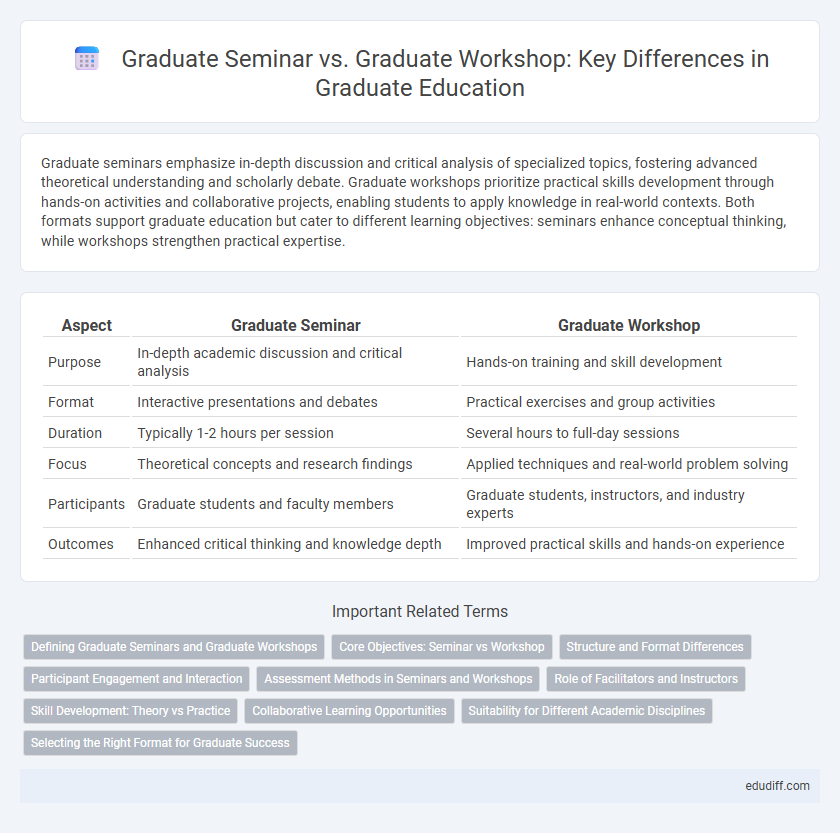Graduate seminars emphasize in-depth discussion and critical analysis of specialized topics, fostering advanced theoretical understanding and scholarly debate. Graduate workshops prioritize practical skills development through hands-on activities and collaborative projects, enabling students to apply knowledge in real-world contexts. Both formats support graduate education but cater to different learning objectives: seminars enhance conceptual thinking, while workshops strengthen practical expertise.
Table of Comparison
| Aspect | Graduate Seminar | Graduate Workshop |
|---|---|---|
| Purpose | In-depth academic discussion and critical analysis | Hands-on training and skill development |
| Format | Interactive presentations and debates | Practical exercises and group activities |
| Duration | Typically 1-2 hours per session | Several hours to full-day sessions |
| Focus | Theoretical concepts and research findings | Applied techniques and real-world problem solving |
| Participants | Graduate students and faculty members | Graduate students, instructors, and industry experts |
| Outcomes | Enhanced critical thinking and knowledge depth | Improved practical skills and hands-on experience |
Defining Graduate Seminars and Graduate Workshops
Graduate seminars are structured, discussion-based sessions emphasizing in-depth analysis of specialized academic topics, fostering critical thinking and scholarly dialogue among students and faculty. Graduate workshops concentrate on practical skill development and applied learning through hands-on activities, collaborative projects, and expert feedback designed to enhance professional competencies. Both formats play distinct but complementary roles in graduate education by balancing theoretical knowledge with experiential learning.
Core Objectives: Seminar vs Workshop
Graduate seminars prioritize critical analysis and discussion of advanced theoretical concepts, fostering deep intellectual engagement and research skill development. Graduate workshops emphasize practical application and hands-on experience, targeting skill acquisition and real-world problem-solving within specialized fields. Both formats enhance academic growth but differ in approach: seminars cultivate analytical thinking, while workshops build technical competency.
Structure and Format Differences
Graduate seminars typically feature small groups of students engaging in in-depth discussions on specialized topics, with a focus on critical analysis and student presentations. Graduate workshops emphasize hands-on learning, skill development, and practical application through interactive activities, often guided by instructors or industry experts. Seminars prioritize dialogue and theory exploration, while workshops center on experiential learning and collaborative problem-solving.
Participant Engagement and Interaction
Graduate seminars foster in-depth participant engagement through active discussions, critical analysis, and collaborative exploration of specialized topics, encouraging deep intellectual interaction. Graduate workshops prioritize hands-on activities and skill development, promoting practical engagement and peer-to-peer learning in a more interactive, task-oriented setting. The seminar structure suits theoretical knowledge exchange, while workshops excel in experiential learning and immediate application of concepts.
Assessment Methods in Seminars and Workshops
Graduate seminars typically emphasize formative assessment methods such as presentations, peer feedback, and critical discussions, fostering analytical thinking and in-depth understanding. Graduate workshops often incorporate hands-on projects, practical tasks, and real-time evaluations, promoting skill application and iterative learning. Both formats utilize reflective journals and self-assessment to measure progress, but seminars lean more toward theoretical exploration while workshops prioritize experiential competence.
Role of Facilitators and Instructors
Graduate seminars feature facilitators who guide discussions and encourage critical thinking among students, fostering in-depth analysis and collaborative learning. Graduate workshops involve instructors who provide hands-on training, practical skills development, and direct feedback to enhance applied knowledge. Both roles are crucial, with facilitators emphasizing conceptual exploration and instructors prioritizing skill acquisition.
Skill Development: Theory vs Practice
Graduate seminars emphasize theoretical skill development through critical analysis, scholarly discussion, and in-depth exploration of academic concepts. Graduate workshops prioritize practical skill acquisition by engaging participants in hands-on activities, real-world applications, and interactive problem-solving sessions. The integration of seminars and workshops provides a balanced approach to mastering both conceptual understanding and practical expertise in graduate education.
Collaborative Learning Opportunities
Graduate seminars offer in-depth discussions led by faculty, promoting critical analysis and peer interaction within specialized academic fields. Graduate workshops prioritize practical skill development through hands-on activities and collaborative problem-solving in smaller groups. Both formats foster collaborative learning but differ in focus--seminars emphasize theoretical discourse while workshops enhance applied competencies.
Suitability for Different Academic Disciplines
Graduate seminars typically suit disciplines emphasizing theoretical discussion and critical analysis, such as humanities and social sciences, where students engage deeply with complex texts and scholarly dialogue. Graduate workshops align better with practice-oriented fields like engineering, fine arts, or computer science, focusing on hands-on activities, skill development, and collaborative projects. Selecting between seminars and workshops depends on the academic discipline's need for either conceptual exploration or applied learning methodologies.
Selecting the Right Format for Graduate Success
Graduate seminars offer in-depth discussions and critical analysis of specialized topics, fostering a collaborative academic environment ideal for developing research skills. Graduate workshops provide practical, hands-on training sessions aimed at enhancing specific competencies, such as data analysis or academic writing. Choosing the right format depends on your immediate learning goals, with seminars suited for conceptual exploration and workshops designed for skill acquisition.
Graduate Seminar vs Graduate Workshop Infographic

 edudiff.com
edudiff.com